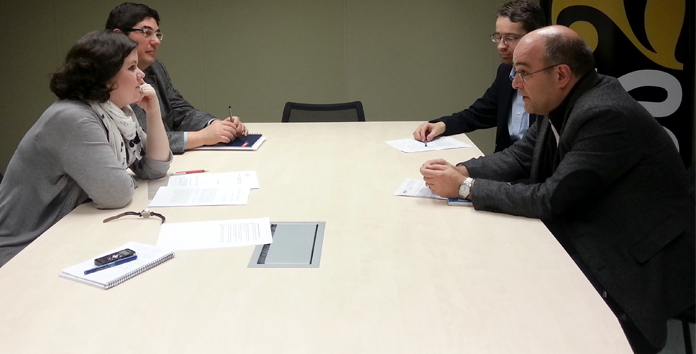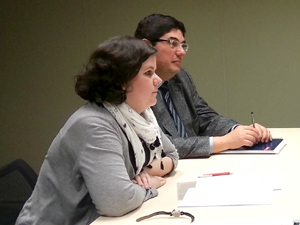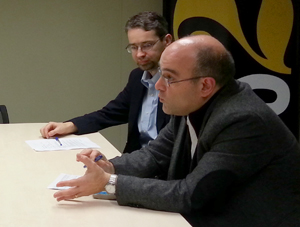2014_02_25_ICS_En el debate sobre el aborto no está en juego un conflicto de opiniones privadas, sino un fenómeno público: la vida de un ser humano
"The discussion On abortion, it does not address private opinions, but a public phenomenon: a human life."

Four researchers from the Institute for Culture and Society (ICS) of the University of Navarra talked about abortion during a meeting in the Library Services of Humanities of campus pamplonés. With the goal of contributing to unravel the complexity of this phenomenon, they shed light on it from different perspectives of knowledge: the Philosophy, the Education, language and ethics in public life.
Participating in the meeting were David Thunder, from project "Religion and Civil Society"Carlos Beltramo, from "Education of Affectivity and Human Sexuality"Inés Olza, from "Public discourse"; and Mariano Crespo, from "Natural Law and Rationality internship".
What is the status of discussion about abortion?
Mariano Crespo (MC): Abortion implies a decision about a new life that is in a state of absolute innocence. When in the 1980s in Spain we began to talk about its decriminalization in three specific cases, Julián Marías published a series of articles in which he lamented the lack of a strictly rational discussion on this issue. This diagnosis is still valid today. It is not uncommon for discussions to end in disqualifications of the positions of others, accusing them of wanting to impose certain subjective convictions that are valid only individually or for a specific group.
What role do moral convictions play in this discussion?
David Thunder (DT): We are not talking about defending a private or religious position, but a public phenomenon: the life of a human being and how it interacts with the life of the woman inside. To improve the quality of the public discussion requires more honesty, recognizing that this issue has a public evidence base. Slogans and sound bites must be overcome. Many feel that a conflict of personal opinions is at stake that cannot be arbitrated publicly. When this is the case, the discussion becomes politicized: whoever participates in it has a project or an agenda and wants to impose their will at any cost. In Ireland - my country - abortion has recently been legalized and this has happened: some have taken a position and have not wanted to pay attention to the biological evidence and the health of the woman in order to look for possible solutions when there is an apparent conflict between the two lives.
MC: It is thought that those of us who oppose abortion do so by virtue of certain religious convictions, which are falsely regarded as expressions of emotional preferences. Thus, to say that abortion is wrong would be tantamount to expressing a kind of moral repugnance to that action. Thus, what causes one to be emotionally displeased need not necessarily be displeasing to others. Posed in these terms, the dialogue is nipped in the bud. It is true that many of us have arguments against abortion based on our faith or closely linked to it, but that does not mean that these are radically subjective emotional preferences that we are trying to impose. Before raising the discussion around the legal and ethical aspects related to abortion, it would be essential to "decontaminate" the discussion around such hot topics. In Spain this has yet to be done.
So, is the language surrounding abortion being manipulated to achieve social acceptance?

Carlos Beltramo: Any words or expressions that lower the social impact and staff of abortion spread quickly because they sweeten reality. Probably, the most immune to that word are those who defend new life. However, thepro-life speech also has things to learn. An American specialist stated that we have been wrong for years to focus too little on the woman and almost exclusively on the unborn child, when both are victims. It is important to emphasize that in certain pregnancies - such as those resulting from rape - there is no painless solution, even if we are led to believe that abortion does not entail suffering. Because of this, prochoice advocates have positioned themselves as the defenders of women's rights. They often seek to justify their position with dramatic and atypical cases, taken out of context. In the face of this, we should present stories of people who decided to continue with their pregnancies and are happy, as well as strengthen the research that little by little is revealing the harmful effects of what some already call "post-abortion syndrome".
MC: The question of the ideological conquest of language is not new. It has to do with classical sophistry. There are two ways of understanding language: at the service of reality, to describe what is happening, or at the service of an ideological perspective that aims to influence the behavior of the other. On the other hand, the way in which supporters of abortion conceive freedom proceeds from a certain conception of moral autonomy, as if this had no reference letter to objective moral criteria. But it is worth asking whether this is really the case, whether there are such criteria that regulate the autonomy of conscience: some of them may be values such as one's own and other people's human life.
Regarding the question of freedom of choice, should abortion be considered a right?
IO: The two big words used to defend it are "freedom" and women's "rights. In Spain, the advancement of the progressive abortion provisions has been associated with the attainment of freedoms, with something that we were previously deprived of. The idea has spread that in the 80s, at the beginning of democracy, we began to conquer a right that little by little has been consolidated, and it is considered that limiting it is antidemocratic. The focus is placed on this and the rights of the unborn child are hidden.
DT: Mary Ann Glendon, professor at Harvard University and ICS collaborator, has commented more than once that the concept of rights dominates discussion in public life in the Anglo-Saxon world. But as she points out, when an issue is raised in terms of rights, the discussion is silenced and cut off: if I believe I have a right and the other denies it, I perceive that I am being attacked. In the U.S. that concept has played a big role in the defense of black people and is somewhat admirable. But when extended to any public discussion , including abortion, it does not make it easy to address all aspects of the issue.
Should the rights of the mother take precedence over those of the child?
DT: We observe a paradox: when it is a wanted child, the child has rights, but these disappear when it is an unwanted pregnancy. Our society is based on a foundation full of inconsistencies; one of them consists in proclaiming that all human beings have the same dignity, while at the same time treating the unborn child as if it were not a worthy human being. The unborn presents a status of great vulnerability: it is almost socially invisible and cannot defend itself with its own voice. Precisely, it is striking to see how the groups that have lost their value in the public sphere throughout history have been groups that, for various reasons, did not appear in the prominent places of society or did not have a space to publicly defend their rights, as happened with the slaves in the United States.
CB: One of the main barriers we encounter in defending the rights of the unborn is the continuous questioning and relativization of the point at which we can speak of a human being. This should be one of the main tools we have to establish limits of action, but it is difficult to make society react adequately in the face of scientific evidence. If we add that the embryo is not seen and that the current culture has tended to make it socially invisible, the problem worsens. Hence the importance of educating from childhood so that everyone is aware that, before becoming an adult, it went through the stages of zygote, embryo and fetus, and that its life will continue without interruption until death. In the project "Education of affectivity and human sexuality" we are aware of the importance of the visual in today's culture and in the school material we produce we work a lot with illustrations that help to generate in children, parents and teachers an emotional substrate on which knowledge is based. Because it is one thing for embryology to know that there is a person there and quite another for the child to learn to appreciate the little brother "from the first moment" or to know that he was a zygote and that this is very good.
What valid arguments can be made to defend the culture of life?
MC: In positive terms, we should strive to make the classic distinction between an act and a person: we reject acts committed by certain people, not them. It should also be emphasized that, among human rights, some are more basic than others. The right to life is based on the ontological condition of the human being as opposed to other rights that require a certain development of human conscience (for example, it would not make sense to recognize the right of a seven-year-old child to marry a friend of his age). The first subject of rights is held by the simple fact of being a person and the State should protect it.
CB: We must combat the idea that a law protecting the unborn child is a step backwards in the field of rights. The speech should focus on talking about progress along other lines: the search for greater protection of the unborn child, the expansion of his or her freedoms, etc. This requires using language that refers to positive change to replace that of regression. For example, one could explain the harm that has been done to mothers with previous laws and how one wants to change course in that direction. Throughout history there have been great leaders who have said things against the dominant culture and have been accepted little by little. Right now we have Pope Francis. When he was Archbishop of Buenos Aires, he only referred to abortion in the context of the social commitment of the message of Christ, in situations such as baptisms of children of single mothers in a shantytown or during Holy Week, while washing the feet of children. Thus it is understood that the message is one of love and protection of all human life, which makes what is being proposed more understandable.
IO: I don't know how to do away with the idea that broadening assumptions constitutes progress, because the language is so ingrained. It seems that societies advance irremediably and that a new law implies the conquest of certain freedoms. To affirm that the extension of legal abortion scenarios goes against fundamental rights is considered to be opposed to the idea of hope and progress. Perhaps the core topic consists of underlining how parallel progress is being made along other lines that had previously been left aside, so that the scales are balanced.
DT: Pro-life organizations in Ireland have learned that launching arguments in a public sphere that increasingly defends less and less the life of the unborn leads nowhere if it is not accompanied by the Education in schools, universities... This is the way to gradually change the culture.

